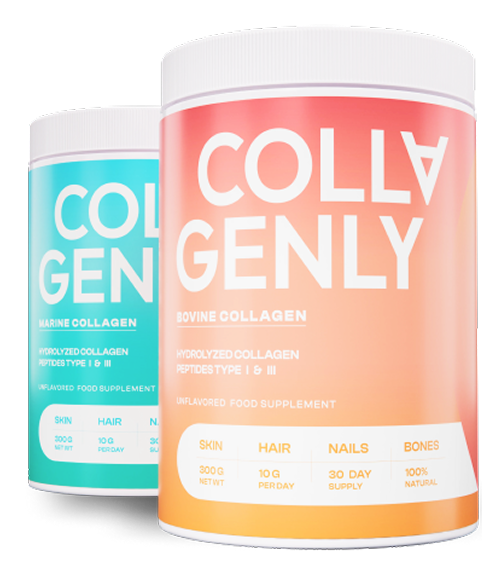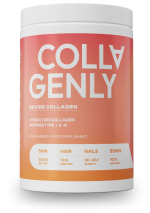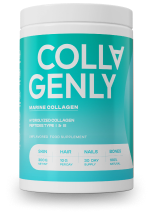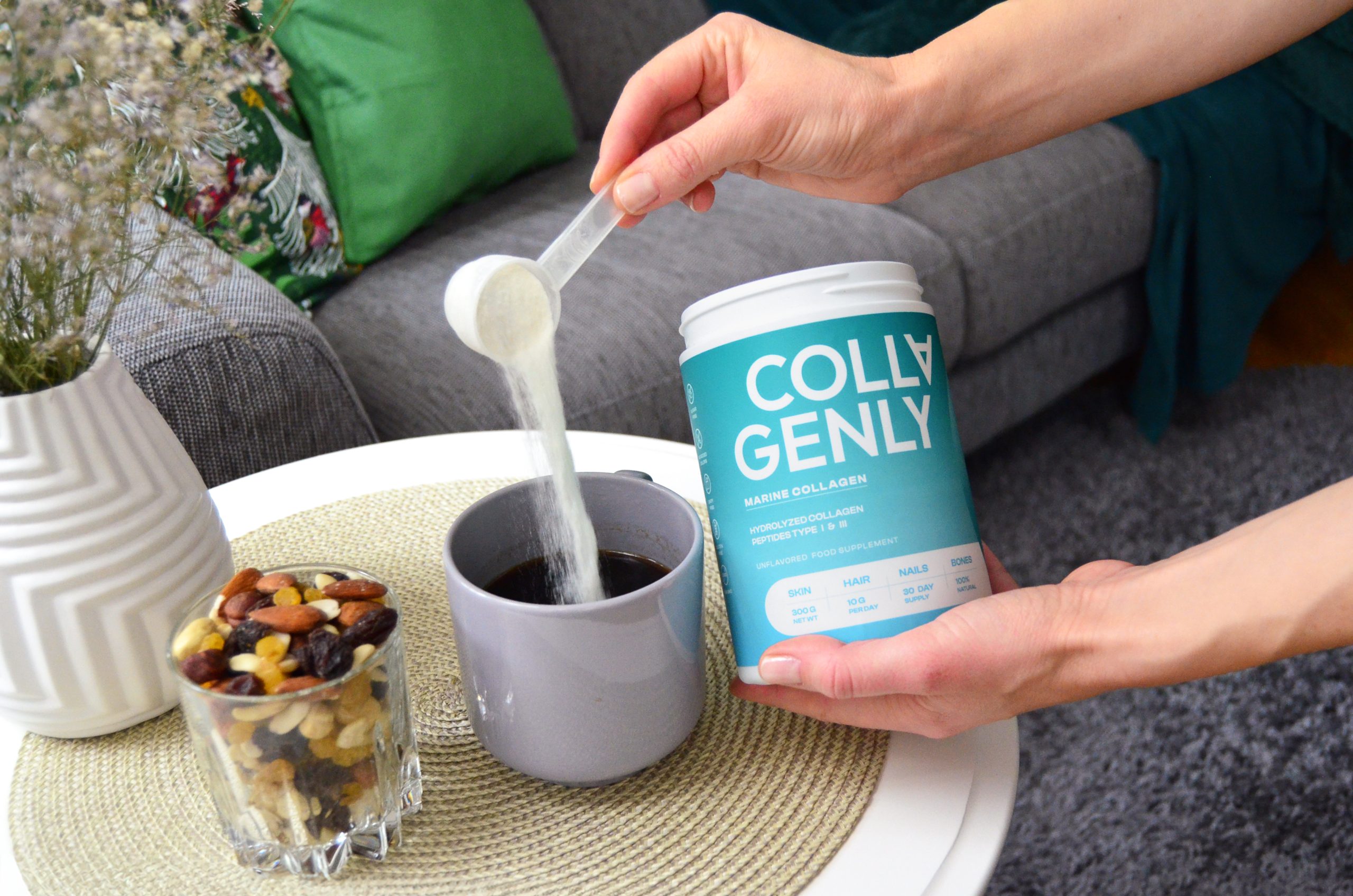Collagen has gained huge popularity over the years, but not without reason. Collagen research has been unfolding a multitude of potential beauty, health and wellbeing benefits.
These results are largely due to collagen being concentrated in the amino acids glycine, proline, and hydroxyproline.
You may be enlightened to read that collagen is beneficial. However, it is
not ‘all sunshine and rainbows,’ as there is also a dark side. We must warn you that there are some collagen side effects.
Some may be at more risk than others, but these collagen side effects can easily be avoided with our expert tips and guidance from your licensed healthcare provider.
In terms of dosage and usage, older adults may need more collagen due to the adverse effects of aging on the degradation of various bodily tissues. For those who are wondering, there are best practices for taking collagen protein, but it depends on your personal preference.
We understand that the benefits of collagen may seem too good to be true, but there are many research articles and real life testimonies to back this up.
But do the benefits outweigh the risks?
Stay tuned as we cover all of the above in much more detail.
Why People Use Collagen
Although this article is dedicated to raising awareness around collagen side effects, we have shared a brief overview of some of the many benefits of supplementing with collagen.
Muscle Mass
Without hiding the truth, collagen is actually a very poor protein source for muscle building. Collagen contains a low quantity of the branched chain amino acid leucine which is the trigger of muscle protein synthesis (muscle building).
However, collagen can still be a source of protein when mixed with other high quality sources. Personally, I include 10g of bovine collagen to 25g of whey protein (35g of protein) giving me all of the amino acids for muscle building from the whey whilst reaping all of the other benefits that collagen has to offer. Preserving muscle mass is crucial for mobility, metabolism, and weight management.
Skin Health
Give or take, the structure of skin is made up of approximately 70-80% collagen. At some point in our late 20s-30s, collagen levels begin to drop by around 1% per year. In turn, leading to the appearance of wrinkles and eventually loose skin by age 50s.
For this reason, supplementing with collagen may help delay the effects of aging. So we could expect healthier and hydrated looking skin, with better elasticity.
In my personal experience, bovine collagen helped to flatten the glabellar lines on my forehead within 6 weeks of taking 10g per day.
Hair And Nail Health
The essential amino acids within collagen protein can also boost nail growth and hair follicle structure. All in all, leading to stronger and healthier hair and nails.
Joint Health
Moreover, the cartilage within joints make up 60% collagen. All the more reason to supplement with collagen.
Collagen can resynthesize cartilage, thereby promoting fasted recovery from high impact sports and lifting. Over the long haul, topping up with collagen can help prevent joint pain, stiffness and mobility.
Bone Health
We cannot forget that bone is also a bodily tissue that contains collagen. Infact, 30% of the bone matrix is made of collagen.
Therefore, we can not deny the importance of collagen to strengthen bones and potentially prevent osteoporosis, especially into later life.
Gut Health
If we remember, the gut lining is partially made up of collagen. So collagen based foods and supplementation can certainly strengthen the gut lining, thus may improve the quality of life for those living with leaky gut syndrome.
BOVINE & MARINE COLLAGEN Get Yours Today!
Shop Now
Overview Of Common Collagen Side Effects
This section is dedicated to giving a brief overview of common collagen side effects, that have been covered more in detail later into the article.
Digestive Issues
A common complaint amongst collagen users is bloating and diarrhea. The reason behind this is either the user can not tolerate the type of collagen (i.e. bovine) or the quantity of protein.
Allergic Reactions
Some individuals are allergic to specific types of collagen like marine, as it is derived from fish. Fish allergies could include hives and swelling, which we will get into in more detail later.
Taste and Smell
One of the more minor collagen side effects, but some individuals are sensitive to the taste and smell of collagen, especially marine or bovine. At times it can leave an unpleasant aftertaste.
Allergies and Sensitivities
In this section, we will cover common allergic factors and signs of intolerance, highlighting the unique risks of each type of collagen.
Most Common Allergies & Sensitivities From Marine Collagen
Many collagen products are marine-based (fish), which is unfortunate for those with seafood allergies. Such individuals may experience side effects listed below.
Shortly after consuming marine collagen, it is rejected by the body. More often than not, provoking a release of histamine and many other chemicals as an immune response.
The rise in histamine leads to hives (urticaria) itching and even scaring. Hives are small to medium swollen lumps that appear all around the body, including: the face, back, legs and trunk.
These lumps can become itchy, where if they are scratched could lead permanent scarring. The duration of hives could be a few hours to days to even weeks.
In the occurrence of these side effects, you can seek medical advice from a licensed healthcare professional i.e., a doctor or a pharmacist, who may suggest an antihistamine.
In some cases, these individuals may experience anaphylaxis, which is considered one of the most severe among collagen side effects.
The symptoms of anaphylaxis may include swelling of the tongue and throat, causing difficulty in breathing.
Based on this fact, anaphylaxis is a life-threatening condition that requires immediate medical attention, i.e., an epinephrine injection.
Most Common Allergies & Intolerance To Bovine Collagen
Approximately 0.5-2% of the population is intolerant to beef. In the case of taking bovine based collagen, their bodies would likely reject it. Signs of intolerance or unusual reactions to collagen products may include moderate to severe stomach pains, bloating, nausea, digestive issues and diarrhea.
Skin conditions like hives and eczema are also possible collagen side effects.
Specific Health Conditions & Interactions
It can be a daunting experience living with a medical condition and not knowing how a supplement may interact with your condition or medication.
We have shared the effects of collagen for those with organ problems and those using certain medicines.
Worry not, because the following section gives you an idea of how to avoid these negative collagen side effects.
Organ Condition Exacerbation
One of the primary functions of the kidneys is to filter out the waste product (urea) from broken-down protein. As we have learned, collagen is high in protein.
You can probably see where this is going. Taking too much collagen protein or protein, in general, can put a strain on already impaired kidneys, accelerating the decline in function.
The same applies to the liver. The liver’s role is to break down and process protein. For those with pre-existing liver problems, high amounts of collagen protein can cause further liver complications.
Based on these facts, we can not stress the importance of consulting with your licensed medical professional before using any new supplement, who may be able to offer some guidance.
Drug Interactions
There are no dangerous interactions between any prescription medication and collagen supplements. However, some drugs are known as corticosteroids and anti inflammatories can degrade collagen synthesis (collagen building) and the effect of collagen supplements.
Who Might Be at Higher Risk
It is no surprise that those who are allergic to seafood may be at higher risk of marine collagen side effects.
On the other hand, those with beef intolerance would probably not be able to tolerate bovine collagen.
When it comes to the potential of collagen exacerbating organ conditions, those at most risk would be kidney or liver patients.
How to Minimize or Avoid Side Effects
To minimize the chances of collagen side effects, you would opt for the collagen type that is most tolerable. For example, if you have seafood allergies, you may opt for bovine collagen.
For those with beef intolerance, marine collagen may be a better fit. If your body does not respond well to either, you could try a veg-based collagen.
In some rare cases you may experience side effects from all types of collagen, where you may want to refrain altogether.
In terms of living with kidney and/or liver problems, you can consult a licensed health care professional who may help design a diet plan that limits total daily protein yet still includes enough collagen.
To avoid interactions between collagen and prescription medicine, ensure that you are not taking them together. For example, you may be instructed to take your prescription medication every morning, in which case you could wait 5 to 6 hours and take collagen for lunch.
The least worrisome collagen side effect in our opinion is smell and taste. This can quite easily be countered by taking your collagen with a tasty and pleasant smelling beverage. Ever tried rose water?
Collagen Dosage And Usage Guidelines
The research shows that the older demographics above 50-60, lose collagen at accelerating rates compared to their younger counterparts, as we previously mentioned.
For this reason, there is an ideal daily dosage for different demographics (e.g., adults, seniors) as listed below.
Adults
Adults around the age of 30 may reap full benefits from consistently taking 2.5-5g of collagen per day. Most studies have shown an improvement in all kinds of health, fitness, and aesthetic markers within 8-12 weeks.
Seniors
Seniors over the age of 50 may see results from consistently taking anywhere from 10g and up to 15g of collagen per day. Collagen should be taken consistently over the long term for more than 12 weeks to see and feel its full benefits.
Best Practices For Taking Collagen
In all honesty, you can take collagen however you like, as long as it is tolerable.
Some suggestions could be that the collagen powder is mixed with a beverage of choice and consumed any time of the day. You could try capsule form with a meal or snack.
Personally, I take bovine collagen powder combined with some whey protein, to maximise all of the health and fitness benefits.
The risks of collagen side effects can be reduced by opting for a collagen source that you respond well to.
Research Articles/ Real Stories
Before taking a supplement, it is encouraging to know that it is backed by research and has some real-life positive effects.
We have gone over 2 recent studies that looked at the use of collagen and knee joint repair. This is followed by 3 real life testimonies of how collagen has impacted quality of life and aesthetics.
Peer-Reviewed Journal Articles
A recent 2021 study looked at the effects of taking 5g of collagen per day on 18-30-year-olds with knee discomfort and lowered range of motion. The researchers also put together a placebo group (0g collagen) from the 180 participants.
At the end of the 12 week study, the researchers found an improvement in range of motion during squats and a reduction in pain with collagen use. This outcome was most likely a result of tissues surrounding healing faster.
A 2020 study from the journal applied physiology, nutrition, and metabolism recruited 167 participants between the ages of 56-68 who had self reported knee pain.
The participants were split into two groups who either took a 10g collagen peptide or placebo (0g placebo).
The study lasted 12 weeks. At the end of the study, more participants from the collagen group had reported lower knee pain, which was evident in their knee mobility and increased range of motion
Real Life Stories & Testimonials
“Great products and quality. My hair is finally having some volume again and skin is improving too – much less wrinkles on my face. I definitely recommend it!” – Anna C.
“Collengly seems really helpful! My old joints are not hurting so much anymore. Some wrinkles on my face are gone too” – Ingrid T.
“Brought it for my wife to test out. She tells me it’s the best supplement she’s tried.” – Tom C.
Frequently Asked Questions
Below, we have answered some very frequently asked questions that have been thrown into our email address multiple times.
What are the skin benefits of collagen?
Collagen may promote skin hydration and elasticity, thereby reducing the appearance of lines and wrinkles.
Can collagen help with joint pain?
Most certainly! Collagen can help build the soft tissues and hard tissues around the joint, reducing pain, stiffness and even osteoarthritis. In turn, improving mobility and joint range of motion.
Does collagen support muscle mass?
Collagen can help, especially when taken together with a high quality protein source. Indirectly, the joint healing properties of collagen can allow users to lift weights and build muscle.
Can collagen improve hair and nail health?
Absolutely! The nails are considered bone and collagen promotes bone mineral density making them less brittle. Collagen will also nourish hair follicles.
Are there any collagen side effects?
Unfortunately, there can be collagen side effects for some! If you cannot tolerate a specific type of collagen, you could experience gastrointestinal, skin problems and even breathing problems.
Can collagen cause allergic reactions?
Yes! Those with seafood allergies may experience hives, rashes, scars or even anaphylaxis. Digestive issues are more common for those who are intolerant to bovine collagen
Can collagen cause skin reactions?
Yes! Skin reactions like hives and eczema are a possibility
Benefits vs. Risks: A Balanced Perspective
We would like to think that the benefits outweigh the risks! Collagen is crucial for overall health and well-being. There are always ways to work around collagen side effects, and you simply select a collagen type that does not cause allergies or intolerances.
Simply assessing how your body responds to a collagen type poses no serious risk, in most cases, you may just experience some bloating or a nonthreatening skin condition.
Nevertheless, always consult a licensed medical professional before introducing any new supplement into your diet, who may be able to offer a more personalized approach.
Final Thoughts
All in all, we have learned that there are 3 sources which include marine, bovine and plant based. Collagen has a magnitude of benefits, but also has a fair share of potential side effects for some.
Marine collagen can cause a reaction in hives, rash and scarring. In the worst case scenario you may experience apalaxia which is severe swelling that can block airways.
Collagen does not affect the organ functions of healthy individuals, but in excess may further degrade the organ function of those with kidney or liver problems.
There are no life-threatening interactions with any prescription medication, but some medications may degrade collagen.
Those with chronic organ disease may want to limit daily protein intake to allow room for collagen protein, but always consult your health care professional for a more personalized approach.
If you are worried about drug interactions, then it would be ideal to allow some time between your medicine and collagen supplement.
Young adults may require less collagen compared to seniors, this is because aging causes an accelerated decline in the body’s collagen (2.5-5g vs.10-15g).
The best practice for collagen intake is based on personal preferences, just make sure the collagen is tolerable i.e., mix it with whey protein or rose water.
As you can see from the main discussion of the articles, there is lots of research and testimonies to suggest collagen does work.
To finalize, we would say that the benefits outweigh the risks, especially if you take the correct precautions.
We appreciate that you took the time to read this article. Please read through frequently, as some of the questions may be relevant to you.
If not please feel free to reach out with your question or query and we will get back to you as soon as possible.
REFERENCE SECTION
Naughton, R.J., Clifford, T., Harper, L.D. The effects of collagen peptide supplementation on body composition, collagen synthesis, and recovery from joint injury and exercise: a systematic review
Mishti Khatri amino acids, 53(10):1493–1506, 2021
Alcock, R.D., Shaw, G.C., Tee, N., et al.
Plasma Amino Acid Concentrations After the Ingestion of Dairy and Collagen Proteins, in Healthy Active Males Frontiers Of Nutrition, 6(1): 163, 2019
Riekki, R., Jukkola, A., Sassi, M.L., et al. Modulation of skin collagen metabolism by irradiation: collagen synthesis is increased in irradiated human skin British Journal of Dermatology, 142 (5): 874–880, 2000
Rustad, A.M., Nickles, M.A., McKenny, J.E., et al. Myths and media in oral collagen supplementation for the skin, nails, and hair: A review Journal Of Cosmetic Dermatology, 21(2): 438–443, 2021
Zdzieblik, D., Brame, J., Oesser, S., et al.
The Influence of Specific Bioactive Collagen Peptides on Knee Joint Discomfort in Young Physically Active Adults: A Randomized Controlled Trial Nutrients, 13(2):523, 2021
Kruger, T.E., Miller, A.H., Wang, J. Collagen Scaffolds in Bone Sialoprotein-Mediated Bone Regeneration
The scientific world journal, 5(1): 1–6, 2013
Mariette, A., Grady, R.O., Prawitt, J.
Effect of a Daily Collagen Peptide Supplement on Digestive Symptoms in Healthy Women: 2-Phase Mixed Methods Study JMIR Publications advancing digital health & open science, 6(5): e36339, 2022
Ahmed, M., Verma, AK., Patel, R. Collagen extraction and recent biological activities of collagen peptides derived from sea-food waste: A review Sustainable Chemistry and Pharmacy, 18(1): 100315, 2020
Dodd, A.,Hughes, A., Sargant, N., et al.
Evidence update for the treatment of anaphylaxis Resuscitation, 163(3): 86–96, 2021
Scanes, C.G. Chapter 3 – Animal Products and Human Nutrition Animal and Human Society, 5 (1): 41–64, 2018
Friedman, A.N. High-protein diets: Potential effects on the kidney in renal health and disease American journal of kidney disease, 44(6):950–962
Wei, A.S., Callaci, J.J., Dainius, J., et al.
The Effect of Corticosteroid on Collagen Expression in Injured Rotator Cuff Tendon
The Journal of Bone & Joint Surgery, 88(6): 1131–1338, 2006
Bongers, C., Haaf, D., Catoire, M., et al. Effectiveness of collagen supplementation on pain scores in healthy individuals with self-reported knee pain: a randomized controlled trial Applied Physiology, Nutrition, and Metabolism, 45(7): 687–804, 2020
 your Cart is empty
your Cart is empty 

 Verified Customer
Verified Customer 



